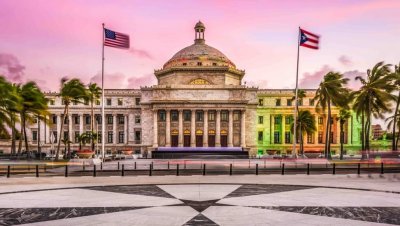Puerto Rico legalized medical cannabis in the summer of 2017. Two months later Hurricane María tore through the island, leaving it in chaos and without electricity for months on end. Political turmoil and earthquakes followed. And this year, the pandemic has wreaked havoc on the population.
However, through it all, the medical cannabis industry has managed to thrive, selling an average of $10 million a month in 2020. To date, sales have reached $51.4 million. Last year, sales reached $128.5 million and produced $14 million in taxes.
“We’ve had our ups and downs," says Raúl Rodríguez, who owns two cannabis stores on the island. "But we can’t complain because we’ve had sustained growth."
Rodriguez believes the market still has space to grow, particularly in the center of the island, where there are not as many dispensaries as near the capital, San Juan.
“(Metro) areas are saturated and you can find sometimes three stores in five blocks and that is ridiculous for the industry we have here. The center of the island has more space for a new market,” he says.
Strict rules
The restrictions on medical cannabis in Puerto Rico are significant. It can be used in Puerto Rico legally for a specific list of 25 specific health conditions, and it has to be authorized by a certified doctor. There are 394 doctors licensed to prescribe cannabis and 92,500 licensed patients. There are more than 200 cannabis businesses here, but only one credit union offers limited banking services to the entire industry.
Shadiff Repullo, a lawyer and cannabis activist based in Puerto Rico, believes the industry would be bigger if the government would eradicate criminalization. She points out that a person with one ounce of cannabis can still be arrested.
But despite these obstacles, Repullo is optimistic about the industry's growth. “We have a very old population, more so than any state, because younger people have moved," she says. "Because of everything that has happened—[Hurricane] María, the governor resigning, the earthquakes—I think there is a lot of anxiety. Since [cannabis] can be used as a prescription for anxiety and pain, there is a big market here.”
Recreational use a distant dream
The possibility of legalization for recreational is not in the cards, as none of Puerto Rico's political candidates openly endorse it. “Most of the candidates have talked about it, but none of them have talked about recreational use,” Repullo says.
But she hopes that the government will eliminate criminal charges for possession and make it easier for business owners to open dispensaries.
According to Denise Maldonado, who oversees the cannabis office under the Department of Health, it can take from six months to a year to open a store.
“We see that most dispensaries are in the metro area, but this is where we have the majority of the patients," she says. "I see now that, since we are getting more patients from the center of the island, we are seeing more licenses for stores in these rural areas. As it is right now, the patients have to travel to the metro area."
However, through it all, the medical cannabis industry has managed to thrive, selling an average of $10 million a month in 2020. To date, sales have reached $51.4 million. Last year, sales reached $128.5 million and produced $14 million in taxes.
“We’ve had our ups and downs," says Raúl Rodríguez, who owns two cannabis stores on the island. "But we can’t complain because we’ve had sustained growth."
Rodriguez believes the market still has space to grow, particularly in the center of the island, where there are not as many dispensaries as near the capital, San Juan.
“(Metro) areas are saturated and you can find sometimes three stores in five blocks and that is ridiculous for the industry we have here. The center of the island has more space for a new market,” he says.
Strict rules
The restrictions on medical cannabis in Puerto Rico are significant. It can be used in Puerto Rico legally for a specific list of 25 specific health conditions, and it has to be authorized by a certified doctor. There are 394 doctors licensed to prescribe cannabis and 92,500 licensed patients. There are more than 200 cannabis businesses here, but only one credit union offers limited banking services to the entire industry.
Shadiff Repullo, a lawyer and cannabis activist based in Puerto Rico, believes the industry would be bigger if the government would eradicate criminalization. She points out that a person with one ounce of cannabis can still be arrested.
But despite these obstacles, Repullo is optimistic about the industry's growth. “We have a very old population, more so than any state, because younger people have moved," she says. "Because of everything that has happened—[Hurricane] María, the governor resigning, the earthquakes—I think there is a lot of anxiety. Since [cannabis] can be used as a prescription for anxiety and pain, there is a big market here.”
Recreational use a distant dream
The possibility of legalization for recreational is not in the cards, as none of Puerto Rico's political candidates openly endorse it. “Most of the candidates have talked about it, but none of them have talked about recreational use,” Repullo says.
But she hopes that the government will eliminate criminal charges for possession and make it easier for business owners to open dispensaries.
According to Denise Maldonado, who oversees the cannabis office under the Department of Health, it can take from six months to a year to open a store.
“We see that most dispensaries are in the metro area, but this is where we have the majority of the patients," she says. "I see now that, since we are getting more patients from the center of the island, we are seeing more licenses for stores in these rural areas. As it is right now, the patients have to travel to the metro area."




